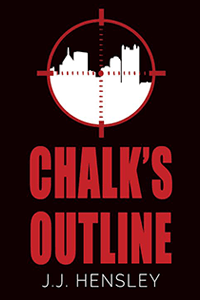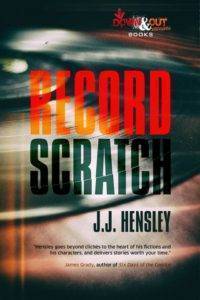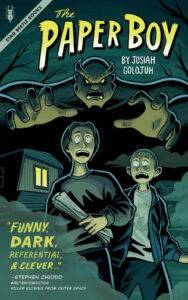J.J. Hensley (a Pittsburgher until very recently) is a former police officer and former Special Agent with the U.S. Secret Service. He’s the author of the novels Bolt Action Remedy, Resolve, Measure Twice, and Chalk’s Outline — which you can start reading right here on Littsburgh! His latest novel, Record Scratch is set in Pittsburgh, like all of Hensley’s novels!
“Hensley is a crime writer who deserves readers’ attention and trust, because beyond his ever-stronger prose, he brings his ex-badge carrier’s street smart eyes to this hard world we live in. Put him on your READ list.” —James Grady, author of Six Days of the Condor and recipient of the Raymond Chandler medal and the Grand Prix du Roman Noir
From the publisher: “It’s a case Trevor Galloway doesn’t want. It’s certainly a case he doesn’t need. The client—the sister of a murdered musician—seems a bit off. She expects Galloway to not only solve her brother’s homicide, but recover a vinyl record she believes could ruin his reputation. Galloway knows he should walk away. He should simply reach over the desk, give back the envelope of cash that he admittedly needs, and walk away. However, when the client closes the meeting by putting a gun under her chin and pulling the trigger, his sense of obligation drags him down a path he may not be ready to travel….”
“J.J. Hensley’s Record Scratch is a tersely written and tightly plotted gem, featuring one of the most unique protagonists around, Trevor Galloway, a man who has a way of getting himself into and out of trouble at an alarming rate. The book is action-packed with a dash of mordant wit, and I can’t wait to read more in this intense, engaging series.” —David Bell, USA Today bestselling author of Somebody’s Daughter
“Record Scratch shocks you out of your ordinary groove. Sometimes witty, other times haunting, but when the needle jumps the track, the body count screams.” —Marc E. Fitch, author of Paradise Burns and Dirty Water
“In Record Scratch, Hensley, a former secret service agent, gifts us with a bounty of goods: a solid mystery, a damaged but relatable main character—one you root for, and swift plotting that weaves a compelling, compulsive tale of music and death and the demons carried by those in law enforcement. Bring me more Trevor!” —Shannon Kirk, international bestselling author of Method 15/33
“Fast, dangerous, and with a unique setting used in interesting ways. Oh, and another thing: It’s entertaining as hell.” —Andrew Pyper, International Thriller Writers Award-winning author
TRACK 1
You Puzzle Me
“I won’t,” I replied.
“It’s a fairly standard non-disclosure agreement.”
“It’s not my standard,” I said, sliding the paper back across the desk.
“Mr. Galloway, you have to appreciate my position. I wish to hire you because of your reputation for discretion.”
“Why is your hair pink?” I asked.
She paused. “I change it every month. This month is pink. Last month it was blue. I like a little variety now and then.”
“What color will it be next month?” I asked.
She shrugged.
 I nodded and swiveled my chair, taking in my surroundings. Tracy Bermindo’s office walls were covered with concert photos, album covers, and framed ticket stubs. If I wouldn’t have known I’d just driven across the Warhol Bridge, I’d think I was in L.A., not Pittsburgh. The downtown high-rise provided views of the city’s North Shore, including the baseball and football stadiums. I shuddered to think what kind of price tag was attached to the twenty-third floor office. Regardless, Tracy Bermindo’s talent management business was doing well.
I nodded and swiveled my chair, taking in my surroundings. Tracy Bermindo’s office walls were covered with concert photos, album covers, and framed ticket stubs. If I wouldn’t have known I’d just driven across the Warhol Bridge, I’d think I was in L.A., not Pittsburgh. The downtown high-rise provided views of the city’s North Shore, including the baseball and football stadiums. I shuddered to think what kind of price tag was attached to the twenty-third floor office. Regardless, Tracy Bermindo’s talent management business was doing well.
“Why do you ask about my hair?”
“Curious,” I replied. “I wondered if you were a singer like your brother.”
Her expression changed and I could see I’d offended her. I wasn’t surprised. My stoic demeanor and habit of asking direct questions does that from time to time.
“My brother was not just a singer, Mr. Galloway.”
“Please, call me Trevor.”
 She sat forward and placed her arms on the desk. I noticed her pupils were large and her eyes were bloodshot.
She sat forward and placed her arms on the desk. I noticed her pupils were large and her eyes were bloodshot.
“Trevor, not only could Jimmy sing, but he could play seven different instruments and was a brilliant songwriter,” she said rapidly. “He was one of the last true musicians, not one of these prime-time pop stars collecting votes on a television show. Jimmy was inspired by the best and he inspired others to be better.”
She leaned back a few inches and took a series of quick breaths. I couldn’t be sure, but she seemed in the habit of having to calm herself down. Tracy closed her eyes and when she opened them again her expression was calm, but firm. She looked me square in the eye—well, both eyes—and concluded, “He was not, as you said, a singer.”
A normal person would manage to turn the corners of their mouth in an upward direction to express a sincere, conciliatory grin before apologizing. Not being good at smiling, I went straight for the apology.
 “I meant no disrespect, Mrs. Bermindo. I’m somewhat ignorant when it comes to the terms you use in the industry.”
“I meant no disrespect, Mrs. Bermindo. I’m somewhat ignorant when it comes to the terms you use in the industry.”
Even absent a smile, I must have conveyed some amount of earnestness because she leaned all the way back in her leather chair and the redness that had accumulated in her face appeared to dissipate. With the pink hair, gold jacket, and flushed face, she was a rainbow of emotions and my instincts were telling me my potential client might be unpredictable.
“Sorry,” she said. “I’m still struggling with my brother’s death and I get very defensive of his reputation. As an agent and publicist, I’m used to dealing with industry types and I sometimes forget that not everyone speaks the language.”
I nodded.
“And it is miss, by the way,” she informed me. “I’m not married.”
I didn’t speak, not wanting to make another misstep and end up stumbling into a conversation about a previous divorce, or whatever reason she had for using a different last name than her brother. Seeing she was experiencing a series of emotions, I decided to tread lightly, but I wasn’t going to relent and sign the non-disclosure agreement. The problem was I needed the job. But, I’ve found the best way to land a job is to act like you don’t need the job. As an unlicensed private investigator, I can pull off the part, since I obviously don’t need the work enough to go get officially licensed. At least that’s what I tell myself.
She glanced at a photo on a bookshelf. It was different than the ones on the walls. It wasn’t of Jimmy Spartan playing at a club or smiling and laughing with members of his band. In the small silver frame, was a faded photo of a young Jimmy Spartan and his younger sister Tracy, standing on a sidewalk in Pittsburgh’s Strip District. From their clothes, I surmised the photo was taken sometime in the eighties when Jimmy was maybe all of fifteen years old and his sibling had barely broken double-digits.
Without taking her eyes off the photo, she said, “Marriages come and go in the music business, Trevor. But, siblings have a special bond. When my brother took the stage name Jimmy Spartan, I actually thought about changing mine too. I was so proud of him and I wanted everyone to know Jimmy was my brother.”
The lady who was still in mourning let out an odd giggle, but when she turned back toward me her eyes were damp. “Our dad was no good, but my mom was decent enough. I kept the Bermindo name to honor her. She died not long after that photo was taken. We moved in with our uncle, but Jimmy was the one who looked out for me while we were growing up. He never turned his back on me, even when he hit the big time. It’s the way he was. Loyalty. It’s the reason that while he had a residence in L.A., he kept his primary home here in Pittsburgh. It’s the reason he let me be his representative when he could have gone with any agency in the country. Because of him, I was able to build a successful business and maintain offices here, in L.A., and in New York.”
She grabbed a tissue from a box on the desk and dabbed her eyes.
After clearing her throat as gently as I’ve ever heard anyone do so, she smiled and said, “Loyalty is the reason I called you.”
I waited.
She sat up and the smile vanished as if it had never been conceived. Whatever emotional trip this lady was taking, the vehicle she was using was a high-speed roller coaster.
“In addition to representing musicians, my agency handles public relations for several corporations. One of those companies is Mountain Resource Solutions.”
I blinked.
“I was told you did some work for them a while back and I was assured you are a man who can be trusted with matters of a delicate nature.”
Now it was my turn to sit up straight.
I said, “Without permission, I can’t discuss any work I’ve done for any of my previous clients.” I liked the way that sounded. It came across as official and business-like. The fact I had only ever had one client and that client was in fact the CEO of Mountain Resources Solutions was irrelevant.
Tracy smiled, “That’s exactly why I want to hire you, Trevor. I need someone I can trust to keep private matters private. My brother’s reputation is everything at this point. I want justice, but I want it administered…quietly.”
I didn’t like the sound of that one bit. For a moment, I thought she had misunderstood what skill set I could bring to the table.
“Miss Bermindo—”
“Call me Tracy.”
“Tracy… I need to be clear about something. I’m not a hitter. I keep things to myself, but I don’t kill people.”
That was true. But not completely. I’d killed before, out of necessity.
She seemed taken aback, and then having replayed her own words in her head, she laughed a genuine laugh that was akin to a cackle.
“Oh, no, no, no,” she said while the reducing her volume to a chuckle. “I’m sorry. I don’t want you to hurt anybody. I simply need you to look into my brother’s murder and develop amnesia if… convenient to his memory.”
Part of me wondered if I should be embarrassed for misinterpreting her words, but another part of me wondered if I had in fact read the subtext accurately.
“Tracy,” I said. “Your brother was murdered nearly eight months ago and the police investigated the case thoroughly. I’m not sure what you think I can do.”
“How do you know?” she asked.
I tilted my head. “How do I know… what?”
“How do you know they investigated the case thoroughly?”
I took a breath and remembered the nonstop newspaper coverage, the local politicians posing for the cameras, and the tributes to a hometown musician who left the world too soon.
“As I’m sure you know, I was a narcotics detective. I get how much pressure is on the PD when the victim of a crime is high-profile like your brother. I assure you the department left no stone unturned.”
Her face darkened. “They missed something.”
“What makes you say that?”
“Because nobody’s been arrested for Jimmy’s murder.”
Silence filled the room for several seconds.
“I want you to sign the agreement,” she said, sliding the paper my way.
“I can’t.”
“Why?”
I inhaled deeply and then spoke. “I have no intention of running to a tabloid and selling a story, or talking to any reporters for that matter. However, if I somehow uncover evidence that could directly identify Jimmy’s murderer, then I have to take it to the police.”
“I understand,” she said. “But what about facts not directly related to the identification of the killer?”
I stared at her and she at me.
“What is it you want to keep quiet, Tracy?”
She swallowed hard and seemed to debate how far she was willing to trust a stranger. If she’d done any real digging, then she had to know my professional history was sketchy at best.
Finally, she explained, “Jimmy was taking drugs.”
I held my hands out in a gesture that should have been interpreted as, ‘Duh.’
“Tracy,” I said in a tone I hoped was patient. “Jimmy was a rock star who cut his teeth in the eighties. He sang songs professing his love for drugs. His biggest album was titled Two Line Rush. His naked body was found covered in cocaine.”
I paused to give her a chance to respond.
When she didn’t speak, I finally said, “I think the cat may be out of the bag about his drug use.”
She shook her head. “Not those kind of drugs.” She started to say something else, but stopped herself.
“I really am going to have to insist on the non-disclosure agreement,” she said. “I’ll pay well above your standard fee.”
I tried to recall my standard fee, but then I remembered I didn’t have one. I’d been paid very well for the case involving Mountain Resources Solutions and had been living off those funds, along with my disability retirement pension, ever since. The pension helped, but the proceeds were dwindling fast. I understood Tracy’s concern for her brother’s reputation, such as it was, but I held my ground and pushed the paper back across the desk.
“Unless something I uncover can lead to someone else being seriously harmed, my lips are sealed.”
She pondered, “I assume if you break confidentiality then you could lose your license.”
“I don’t have a license,” I admitted.
“Why not?”
“So nobody can take it away from me.”
She reached into a desk drawer and pulled out a manila envelope.
Tracy tossed it across the desk and said, “Here is ten thousand dollars in cash. I don’t want a receipt or any record of this transaction. I’ve made arrangements that if you solve the case and preserve my brother’s reputation, you will receive another ten thousand.”
I stared at the envelope before saying, “What drugs?”
She tapped an index finger on the oak in front of her. She did so deliberately and for such a long time, that I thought she might break a nail.
“He was on Donepezel,” she finally said.
I’d worked narcotics for a long time, but that didn’t sound familiar.
“It’s a treatment for memory loss, associated with early Alzheimer’s disease,” she said.
“I don’t remember reading about it in the papers,” I said. “If it was discovered during the autopsy, then it appears the medical examiner and investigating detectives kept it quiet.”
Tracy said, “I know. As next of kin, the detectives filled me in on the results and never mentioned any medications. I didn’t specifically ask about the drug, because I didn’t want to give the story birth if the meds had gone undetected. We were at the point that I had to handle many of Jimmy’s day-to-day affairs, even beyond my role as his agent. Jimmy was having a real tough time. The disease was taking everything away from him — piece by piece.”
Tracy rubbed her eyes and now the tears started to fall in earnest.
I shrugged and said, “It happens.” The words had slipped out as the thought had formed in my mind. As is my habit, I unintentionally came across cold.
Tracy furrowed her brow and said sharply, “I’d heard your nickname, and now I see how it was acquired.”
She stood and pointed to the door.
I held up a hand. “I apologize. I didn’t mean it that way. What I meant was, it’s not unheard of for a person his age to be diagnosed with the disease. I’m just wondering why you think it would damage his reputation. If anything, people would sympathize with Jimmy. He might end up being a rallying call for early Alzheimer’s awareness. It could be a good thing.”
Tracy unclenched her jaw and sat back down.
“You don’t understand,” she said. “Jimmy finished recording a new album last winter. He’d been battling the disease for the past two years and it took a toll on his music. He sent me a digital copy of the album and…it wasn’t good.”
“How not good?” I asked.
“I hadn’t told Jimmy, but the record label wasn’t going to release it unless it was shortened and totally reworked.”
I didn’t know much about the music business, but I knew if a label was refusing to release an album by an artist as well-known as Jimmy Spartan, the product had to have been bad or completely contrary to the label’s expectations.
“I think I’m starting to get the picture,” I said. “You want me to look into Jimmy’s murder, and you want me to make sure the topic of Alzheimer’s never comes up.”
She nodded. “As of now, nobody seems to know about the diagnosis. When the label called to tell me they weren’t happy with the record, I made up an excuse about Jimmy being in and out of rehab and how he just needed to get straight, like he always had in the past. They bought the story.”
“I still don’t understand,” I said. “It seems the damage to Jimmy’s reputation would be minimal. People get sick. Terrible things happen. Your brother had a great run and will be remembered as a great musician.”
“You’re right,” she said. “But, Jimmy’s last record could harm his legacy. He shouldn’t be remembered for that album.”
I thought about that for a moment and then said, “I’m not sure your concerns are warranted. Other than you, only the record label received a copy. You both have a vested interest in not letting it see the light of day, so those copies should be safe. Who else has a copy?”
“Only one person,” she said. “Jimmy’s killer.”
I waited.
“Jimmy loved vinyl records,” she said. “Each time he recorded a new album, the minute he finished he had one special vinyl album made to commemorate the event. He kept it in his house.”
“And it’s missing?” I asked.
“Jimmy was killed in his house, I wasn’t allowed to go through his things for several days. However, I’ve searched every square inch of the place since and I can’t find it anywhere. He had shown it to me two days before the murder and I’m sure he wouldn’t have let it out of his sight. I think whoever killed Jimmy took the record.”
“Why?” I asked.
She tossed her hands up and became animated. “I have no idea. To ruin Jimmy? As a keepsake? Who knows? But, I do know it’s been eight months and the police are no closer to finding the person who did this. How did someone break into Jimmy’s house, manage to smash his head in with a microphone stand, and not leave behind any incriminating evidence? How? You tell me. How?”
I waited for the latest wave to subside and allowed her to collect herself.
“You really don’t show much emotion, do you?” she asked. “Is that why people started calling you the Tin Man? No heart?”
I didn’t say anything.
She rubbed a hand through her hair, leaving one side in disarray. “So, will you take the case?”
I nodded. “I’ll do my best.”
“Do I have your word that you will pursue every lead and do your best to protect Jimmy’s name?”
“You do.”
She reached in the same drawer from which she’d retrieved the envelope of cash, and pulled out a card that had a name and number printed across the front.
“Upon completion of the job, please contact my assistant Melody for the remainder of your payment.”
“I will,” I said. “I’ll contact you periodically to give you updates.”
Her hand disappeared again into the drawer. I assumed she was going to hand me a card that contained her personal phone number. While she did this, I stood, picked up the envelope of cash, and looked down as I slid it inside my jacket. I raised my eyes while extending my hand to take the next card she was going to hand me.
“We won’t be speaking with each other again,” she said, putting a loaded revolver under her chin. She pulled the trigger.
This excerpt of Record Scratch is published here courtesy of the author and should not be reproduced without permission.


























